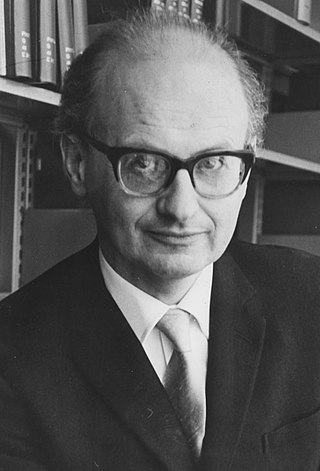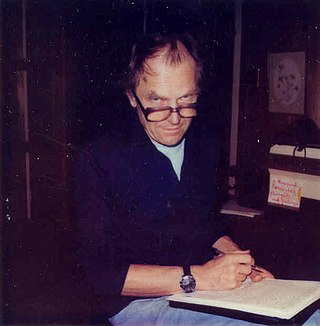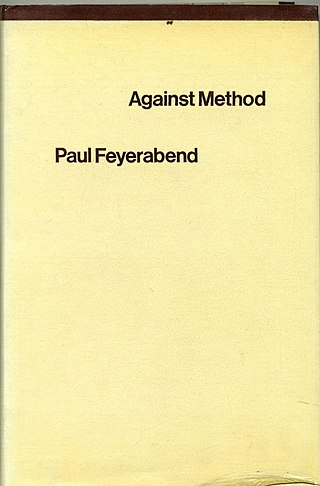Postmodern philosophy is a philosophical movement that arose in the second half of the 20th century as a critical response to assumptions allegedly present in modernist philosophical ideas regarding culture, identity, history, or language that were developed during the 18th-century Age of Enlightenment. Postmodernist thinkers developed concepts like difference, repetition, trace, and hyperreality to subvert "grand narratives", univocity of being, and epistemic certainty. Postmodern philosophy questions the importance of power relationships, personalization, and discourse in the "construction" of truth and world views. Many postmodernists appear to deny that an objective reality exists, and appear to deny that there are objective moral values.

The scientific method is an empirical method for acquiring knowledge that has characterized the development of science since at least the 17th century.

Imre Lakatos was a Hungarian philosopher of mathematics and science, known for his thesis of the fallibility of mathematics and its "methodology of proofs and refutations" in its pre-axiomatic stages of development, and also for introducing the concept of the "research programme" in his methodology of scientific research programmes.

Paul Karl Feyerabend was an Austrian philosopher best known for his work in the philosophy of science. He started his academic career as lecturer in the philosophy of science at the University of Bristol (1955–1958); afterwards, he moved to the University of California, Berkeley, where he taught for three decades (1958–1989). At various points in his life, he held joint appointments at the University College London (1967–1970), the London School of Economics (1967), the FU Berlin (1968), Yale University (1969), the University of Auckland, the University of Sussex (1974), and, finally, the ETH Zurich (1980–1990). He gave lectures and lecture series at the University of Minnesota (1958-1962), Stanford University (1967), the University of Kassel (1977) and the University of Trento (1992).
Scientism is the view that science and the scientific method are the best or only way to render truth about the world and reality.

Ian MacDougall Hacking was a Canadian philosopher specializing in the philosophy of science. Throughout his career, he won numerous awards, such as the Killam Prize for the Humanities and the Balzan Prize, and was a member of many prestigious groups, including the Order of Canada, the Royal Society of Canada and the British Academy.

Mary Beatrice Midgley was a British philosopher. A senior lecturer in philosophy at Newcastle University, she was known for her work on science, ethics and animal rights. She wrote her first book, Beast and Man (1978), when she was in her late fifties, and went on to write over 15 more, including Animals and Why They Matter (1983), Wickedness (1984), The Ethical Primate (1994), Evolution as a Religion (1985), and Science as Salvation (1992). She was awarded honorary doctorates by Durham and Newcastle universities. Her autobiography, The Owl of Minerva, was published in 2005.
Commensurability is a concept in the philosophy of science whereby scientific theories are said to be "commensurable" if scientists can discuss the theories using a shared nomenclature that allows direct comparison of them to determine which one is more valid or useful. On the other hand, theories are incommensurable if they are embedded in starkly contrasting conceptual frameworks whose languages do not overlap sufficiently to permit scientists to directly compare the theories or to cite empirical evidence favoring one theory over the other. Discussed by Ludwik Fleck in the 1930s, and popularized by Thomas Kuhn in the 1960s, the problem of incommensurability results in scientists talking past each other, as it were, while comparison of theories is muddled by confusions about terms, contexts and consequences.
Laurence BonJour is an American philosopher and Emeritus of Philosophy at the University of Washington.

Against Method: Outline of an Anarchistic Theory of Knowledge is a 1975 book by Austrian philosopher of science Paul Feyerabend. The central thesis of the book is that science should become an anarchic enterprise. In the context of the work, the term "anarchy" refers to epistemological anarchy, which does not remain within one single prescriptive scientific method on the grounds that any such method would restrict scientific progress. The work is notable in the history and philosophy of science partially due to its detailed case study of Galileo's hypothesis that the earth rotates on its axis and has since become a staple reading in introduction to philosophy of science courses at undergraduate and graduate levels.
The unity of science is a thesis in philosophy of science that says that all the sciences form a unified whole. The variants of the thesis can be classified as ontological and/or as epistemic/pragmatic. There are also philosophers who emphasize the disunity of science, which does not necessarily imply that there could be no unity in some sense but does emphasize pluralism in the ontology and/or practice of science.
Babette Babich is an American philosopher who writes from a continental perspective on aesthetics, philosophy of science, especially Nietzsche's, and technology, especially Heidegger's and Günther Anders, in addition to critical and cultural theory.
Fred Dycus Miller Jr. is an American philosopher who specializes in Aristotelian philosophy, with additional interests in political philosophy, business ethics, metaphysics, and philosophy in science fiction. He is a professor emeritus at Bowling Green State University.

What is Philosophy? is a 1991 book by the philosopher Gilles Deleuze and the psychoanalyst Félix Guattari. The two had met shortly after May 1968 when they were in their forties and collaborated most notably on Capitalism & Schizophrenia and Kafka: Towards a Minority Literature (1975). In this, the last book they co-signed, philosophy, science, and art are treated as three modes of thought.

The Structure of Science: Problems in the Logic of Scientific Explanation is a 1961 book about the philosophy of science by the philosopher Ernest Nagel, in which the author discusses the nature of scientific inquiry with reference to both natural science and social science. Nagel explores the role of reduction in scientific theories and the relationship of wholes to their parts, and also evaluates the views of philosophers such as Isaiah Berlin.

Targeted Killings: Law and Morality in an Asymmetrical World is a non-fiction compilation book about targeted killing edited by Claire Finkelstein, Jens David Ohlin, and Andrew Altman. It was published by Oxford University Press in 2012. The book grew out of contributions by the authors to a conference in April 2011 at the University of Pennsylvania Law School. Targeted Killings features eighteen essays in five sections arranged by topic. The work argues that after the 11 September attacks by Al-Qaeda in 2001, the United States and other countries began to see the tactic of targeted killing differently. The practice of targeted killing had previously been accepted in situations of self-defence in military settings; after 11 September 2001 it was used to kill non-combatants and those not directly involved in a particular armed force.
Matteo Motterlini is an Italian philosopher of science, behavioral and neuroeconomist. He teaches at Vita-Salute San Raffaele University of Milan, Italy.
Farewell to Reason is a 1987 book by the Austrian philosopher of science Paul Feyerabend. The book includes some reprinted essays published in other venues and was published by Verso Books, which also published Against Method and Science in a Free Society. The primary goal of the book is to trace the historical origins of "rationalism" and argue for a version of relativism and cultural diversity.

Science in a Free Society is the 2nd full length book by the Austrian philosopher of science, Paul Feyerabend. It was published in 1978 by Schocken Books and later reprinted by Verso Books. While Feyerabend never published a second edition, Verso pressed four copies in 1982, 1983, 1985, and 1987.

Conquest of Abundance: A Tale of Abstract versus the Richness of Being is the last book by the Austrian philosopher of science Paul Feyerabend, published posthumously by the University of Chicago Press in 1999. It is edited by Bert Terpstra and includes a foreword from Grazia Borrini-Feyerabend, Feyerabend's 4th and final wife. The book was uncompleted due to Feyerabend's death in 1994 and was written to fulfill a promise made to Borrini-Feyerabend. The unfinished manuscript was published alongside several other previously published papers that engaged with the core themes of the book.











